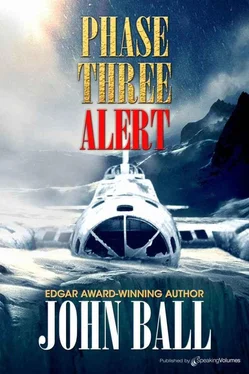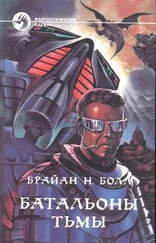Sergeant Feinberg parked his truck and went to one of the few entrances into the BMEWS complex. Despite the utter isolation of the site, an armed guard was stationed immediately inside. Feinberg was required to produce his identification, sign in, and state the exact nature of his business. BMEWS took no chances; the colonel in command was acutely aware of the fact that the construction of the very sophisticated and elaborate facility in the extreme Arctic had been something of an industrial miracle and that the cost had been proportionately high. If for any reason the complex was forced to shut down, a whole flank of the North American continent would be left open without its usual safeguards.
Sergeant Feinberg carried a mailing tube in his hand as he turned down one of the tunnels and by means of it made his way to a large maintenance building that, like everything else at BMEWS, had been built to withstand the worst weather extremes that the Arctic could produce. Equipment and supplies were everywhere — every thing likely to be needed at any time had to be kept on hand and at the ready. Most of the vital vehicles were kept inside where they would be protected from the merciless elements outside. Trackmasters were cocked and ready; an ambulance stood directly before the door; a command car with full radio equipment and special tires was poised beside it.
From one end of BMEWS to the other was a considerable distance measured in part by the four immense antennae, but everywhere the spare equipment was stowed in almost perfect order. Sergeant Feinberg paused before a storage room that was rich with the odor of stacked wood. There was a substantial supply in each of the standard sizes, from lath to great timbers, and adjacent to the racks stood all of the woodworking equipment that might be required to make almost anything. Past a fire-alarm point was the entrance to the machine shop.
He went inside without the usual wide smile on his face. His demeanor was serious, as befitted the place where he was. Nothing was ever taken for granted at BMEWS; the whole vast complex had been put there and maintained for years just to catch the one blip that might appear at any moment on one of its scopes. If that were to happen, then data gathered in fractions of a second would be fed to computers and communications established instantly (on an always-open hotline) to NORAD, the North American Air Defense Command inside Cheyenne Mountain near Colorado Springs.
At NORAD the information from BMEWS, plus any supporting information from the other sites — at Clear, Alaska, and in England — would be evaluated as rapidly as trained and whetted human minds could do it. Then, almost at once, the commanding general or his deputy on duty would have to make an awesome decision. He would make it knowing that something was in the air aimed at the United States or Canada, what its trajectory was, its predicted point of impact, and its probable nature. The first incoming shot might be in the form of a salvo, in which case his decision would be easier, but regardless, he would have to commit the nation, notify the President, and do many other things all within the space of a very few minutes. BMEWS could not afford to make even the first mistake.
Inside the machine shop there was an impressive amount of equipment — astonishing to find in northern Greenland. Everything was as well maintained as the rest of the giant facility; even the floor was spotless. As Feinberg came in, a man twice his size came to meet him. He appeared to weigh at least three hundred pounds, but he moved with good coordination and with the air of someone who thoroughly knows his business.
Perry Feinberg was not used to talking to men who were notably larger than himself, but he was entirely comfortable because he knew the quality of the man he had come to see. For once he came right to the point, because that was the way the man he was addressing wanted it. “You’ve heard about the B-17 that we’re rebuilding down the hill.”
The huge man spoke in a rich baritone. “Everyone knows about it. There are bets out all over the place.”
That was a setback, but Sergeant Feinberg met it squarely. “Are you in on any of them?” he asked.
“Not so you’d notice it. Not yet, anyway.”
Feinberg let out a long sigh of relief. “I want to ask a question,” he said. “If you had to make a particular part for that airplane here, would you be able to do it?”
His host eyed him. “Bring in the blueprints and we’ll make the whole damn thing. We’ve got all the aluminum here, and the tools. Obviously something’s busted — what is it?”
“A main landing-gear fitting.”
“Have you got the drawings?”
“No, but out in my truck I’ve got the part itself. It’s cracked.”
The huge man rested his weight on a bench. “Bring it in, together with a work order signed by the colonel, and we’ll duplicate it for you. Is it heat treated?”
“From the general look of it I would say no. Remember that it was originally made more than thirty years ago; they weren’t quite as sophisticated then.”
“All right, I’ll examine it and see which way to go.”
“You have the stock on hand?”
“We’ve got everything; we have to have.”
Feinberg waved his hand. “And the equipment,” he noted.
“Yes, and one thing you forget: we know what the hell we’re doing.”
Perry Feinberg looked around before he continued. “Our colonel has given us his tacit blessing so there’s no sweat about that. But I don’t have a work order.”
“Then get one; simple as that.”
“Perhaps I have something else.”
“There is no something else, Perry, you know that. The boss wants things done right, and so do I.”
“Look, I’m not very sure that I can get a work order — a formal one, that is, but Colonel Kleckner carries weight.”
“He sure does — get him to ask for it.”
“If I have to, I will, but I do have another thought.” He unrolled the picture and laid it out on a workbench.
The powerful man bent over and studied it. “That sure in hell is something,” he admitted, “but Mike Murphy might not appreciate it. He’s pretty square, you know.”
“I do, and he’s going out on the next rotator. He hasn’t seen this; he doesn’t know that it exists.”
“Is that autograph genuine?”
“I’ll cover all bets; a friend of Major Valen’s got it in Hollywood for us.”
“You probably wanted a radio fixed.”
“Right on — but if he saw this, he’d have kittens on the spot.”
“He sure would. And he’s bound to; these will be out in the millions in a little while. It’s a damn good shot and Monica Lee is very popular. He can’t miss it.”
Sergeant Feinberg had the conversation at the critical point and he knew it; everything now depended on how well he presented the next piece of information. “He’s going to miss it,” he said, “because it’s never going to be published. Monica Lee wants to change her image, but her agent will see her dead first. There’s a very strict morality clause in her contract because of the type of roles she usually plays. This clearly would violate it, so her agent unleashed the legal eagles and they bought it back. This is an advance proof that got away. It may be the only one that ever will.”
The man in overalls was thoughtful. “Next to Diahann Carroll, she’s the best-looking woman I’ve ever seen in my life.”
“Damn right,” Sergeant Feinberg agreed, slightly altering his choice of words. “I brought it to show you because I know that you’re a connoisseur and a major collector of the species.”
“There is nothing that equals the beauty of a lovely woman. In this particular instance, there is no vulgarity. No distorted pose, no ultrasuggestive covering-up with a coyly held hand.”
Читать дальше












